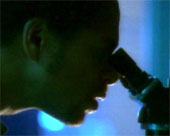May 31, 2005
Feature
Science and Math: Not Just for Nerds Anymore
 |
Not content with those four shows, the networks have added more on. For instance, there's House where the acerbic Dr. House and his team of diagnostic specialists utilize a formidable array of medical tests, scientific deduction and sheer knowledge to diagnose mind-boggling health related mysteries. Following in the "let's all go solve a problem" vein is Numb3rs, a crime solving drama that doesn't use science. Instead, it turns towards that horror of horrors: mathematics to do the crime solving. No crime is quite so fascinating until somebody has pulled out Heisenberg's Uncertainty Principle or talked about Schrdinger's Cat and added mathematical equations a la A Beautiful Mind.
Just 20 years ago, it would have been unthinkable to not only mention math, but to make it the focal point of a show. Not any more. TV isn't scared of throwing technical terms around nowadays. Now, more than ever, the viewer is inundated with phrases like "geometric progression" and "respiratory arrest." Not only that, some character on Science Show Masquerading as Science for the Couch Potato is going to ask the Resident Science Expert to explain said long technical term. This is, of course, the cue for Resident Science Expert to wow his colleague (and the viewer) with an easy to understand, yet somehow intelligent explanation of the Scientific Phenomenon Du Jour. Said phenomenon, will, of course, end up saving the day, and viewers like you and me can feel good about plunking ourselves down in front of the TV because we just learnt something new.
If only Organic Chemistry or Differential Calculus were equally fascinating. The burning question then becomes: why all these scientifically (and mathematically) oriented shows? Why now? Why the sudden influx of high brow science and math? Is it some commentary on today's society and our fascination with empirical studies? We are living in an era where our DNA coding has been cracked and where 7 million dollars have been put aside in the event that 7 impossible math problems are solved. Have we advanced so far that science is now as commonplace as speaking? So it would seem. I would like to set forth a hypothesis and analyze this scientifically. Or attempt to, anyway.
Television is a remarkably far-reaching medium, one that acts on a kind of feedback loop from its audience. In its own way, it reflects the mores and values of the society that it originates from, and along the way, influences society, just as society influences it. In the 1950s, that was wholesome family shows like I Love Lucy and Leave It To Beaver. Nowadays, it's medical dramas and crime scene solvers. Does this mean that we are all doctor or crime scene investigator wannabes? On the contrary.
| Science is the fascination of our times. In a period of increasing global problems like ozone layer depletion and social upheaval, we are looking for something that can solve these dilemmas. |
It's no wonder then that TV shows have a scientific bent to them. We turn to TV to solve our problems for us. For 43 minutes, we are sucked into a world where logic and rational thought reigns, and at the end of that time, the crisis will be over and all will end well. Take House, for instance. In one episode, House and his team of specialists were trying to diagnose and treat a girl who was having seizures and who was bleeding into her brain. She will die in 2 hours if we can't diagnose her illness! they say, and we get anxious. Will she be saved in time? Throughout the episode, the doctors perform tests and prescribe drugs, while trying to fit diagnoses of all sorts to her symptoms. All the while, they fight against time, and we worry over the fate of their patient.
This sort of logical problem-solving focus is not restricted to medical shows. Crime-solvers like CSI and Numb3rs also feature this style of story telling. A seemingly unsolvable criminal case can be cracked because of some arcane mathematical pattern that a genius mathematician can see in human behavior. In CSI, it's the investigator's analysis of gunpowder spatter towards the murder weapon, and by extension their murder.
Ultimately, we turn to TV not only as entertainment, but as a reflection of what we desire, and nowadays, we want difficult problems to be solved. At the end of the day, TV delivers. The patient heals and gets better. The criminal is caught and brought to justice. The viewer is happy, because all his questions are answered, and everything is tied up nicely with a bow. If only life was so easily solved in 43 minutes or less.
Email the author.
All written content © 2005 by the authors. For more information, contact homer@smrt-tv.com
